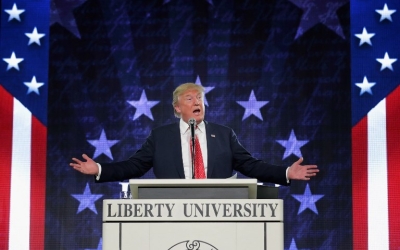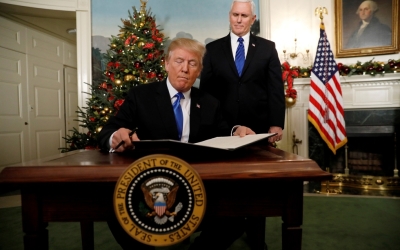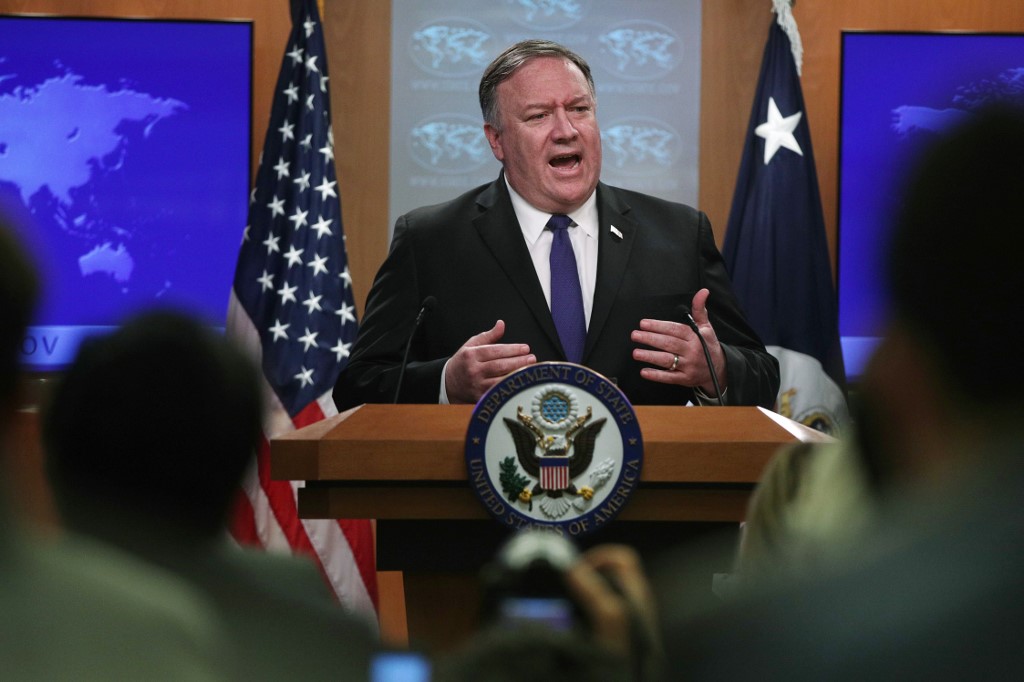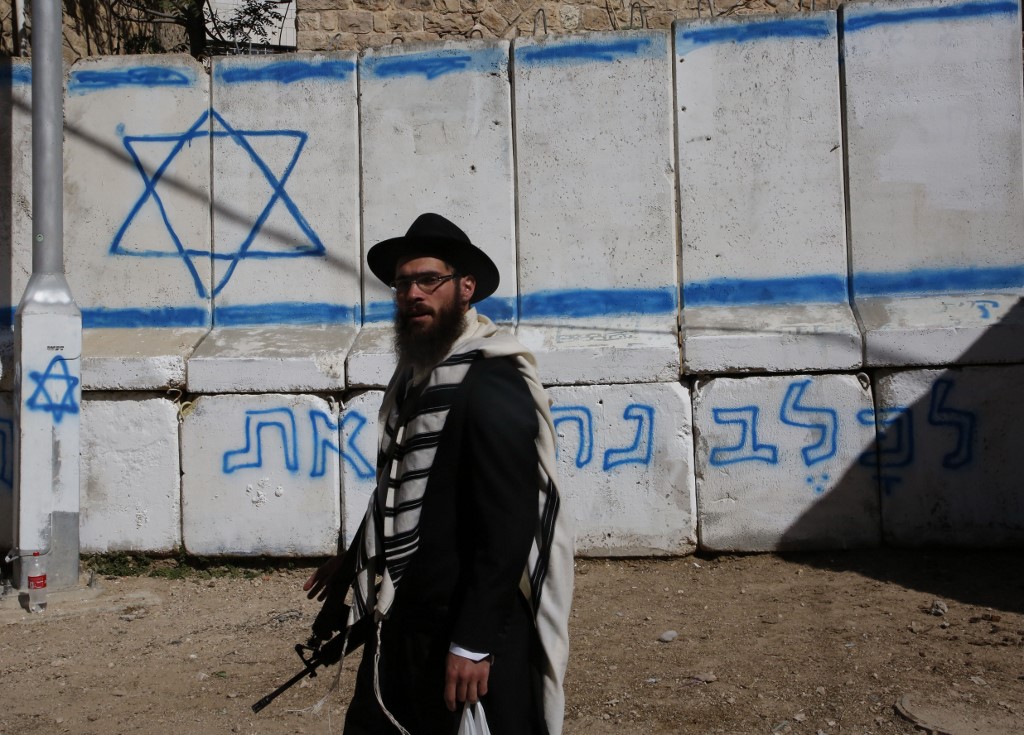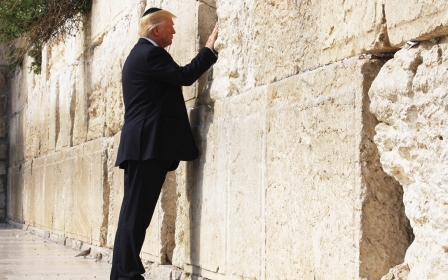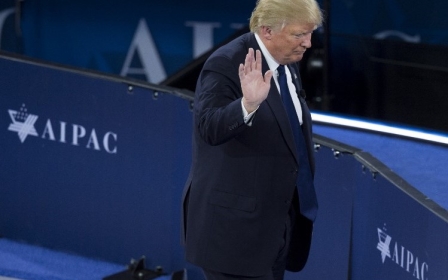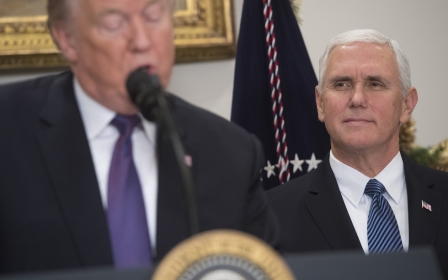How Evangelical Christians risk setting the Middle East on fire
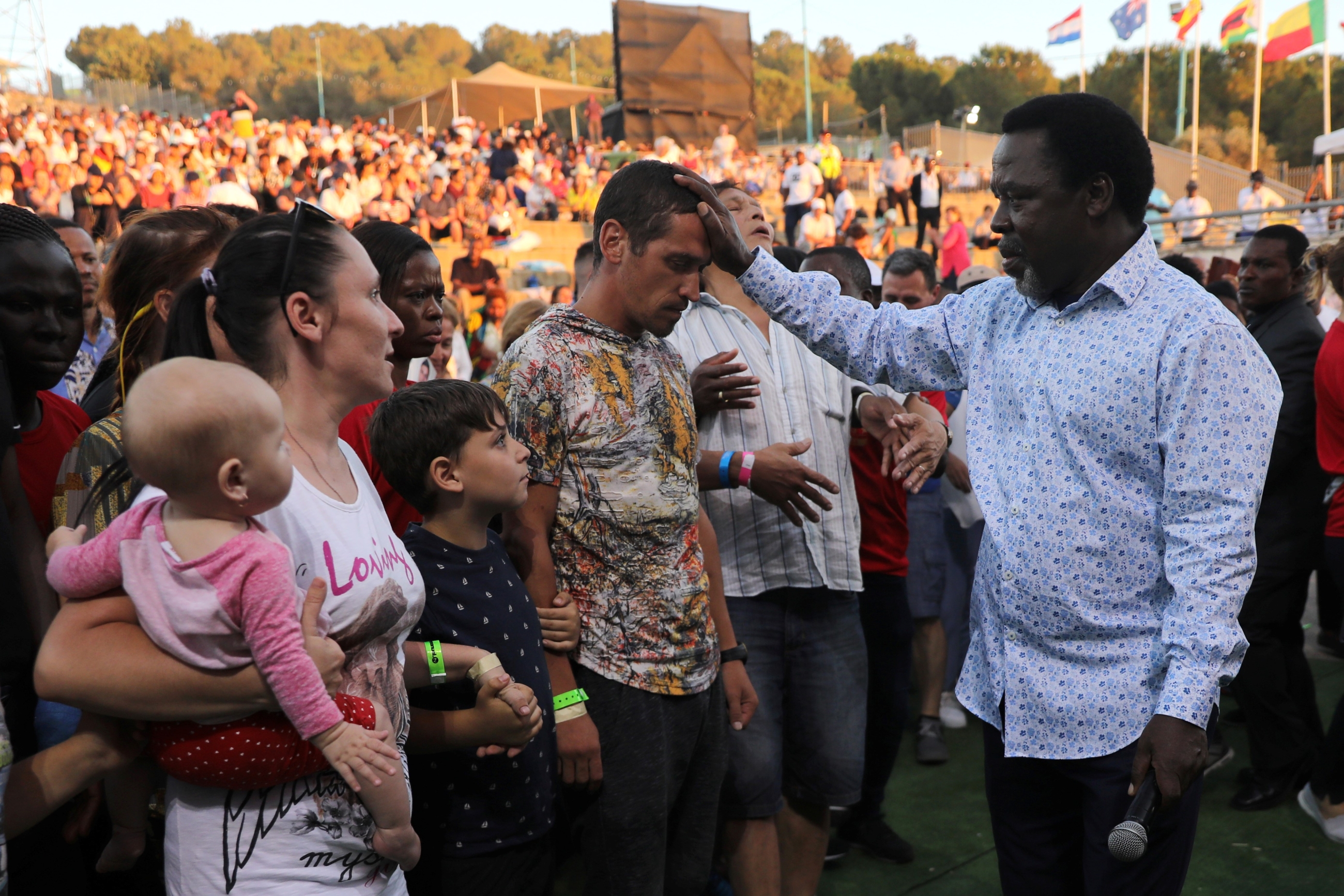
The recent arrival of Africa’s most popular televangelist preacher, TB Joshua, to address thousands of foreign pilgrims in Nazareth produced a mix of consternation and anger in the city of Jesus’s childhood.
There was widespread opposition from Nazareth’s political movements, as well as from community groups and church leaders, who called for a boycott of his two rallies. They were joined by the council of muftis, which described the events as “a red line for faith in religious values”.
Joshua’s gatherings, which included public exorcisms, took place in an open-air amphitheatre on a hill above Nazareth that was originally built for papal masses. The site was used by Pope Benedict in 2009.
The Nigerian pastor, who has millions of followers worldwide and calls himself a prophet, aroused local hostility not only because his brand of Christianity strays far from the more traditional doctrines of Middle Eastern churches. He also represents a trend of foreign Christians, driven by apocalyptic readings of the Bible, interfering ever more explicitly in Israel and the occupied Palestinian territories – and in ways that directly aid the policies of Israel’s far-right government.
Much-needed tourism boost
New MEE newsletter: Jerusalem Dispatch
Sign up to get the latest insights and analysis on Israel-Palestine, alongside Turkey Unpacked and other MEE newsletters
Nazareth is the largest of the Palestinian communities in Israel that survived the Nakba, or catastrophe, of 1948, which forced most of the native population out of the bulk of their homeland and replaced it with a Jewish state. Today, one in five Israeli citizens are Palestinian.
The city and its immediate environs include the highest concentration of Palestinian Christians in the region. But it has long suffered from the hostility of Israeli officials, who have starved Nazareth of resources to prevent it from becoming a political, economic or cultural capital for the Palestinian minority.
Evangelical tourism to Israel has been steadily rising, now accounting for about one in seven of all overseas visitors
The city has almost no land for growth or industrial areas to expand its income base, and Israel has tightly constrained its ability to develop a proper tourism industry. Most pilgrims pass through briefly to visit its Basilica of the Annunciation, the site where the angel Gabriel reputedly told Mary she would carry Jesus.
Nazareth’s municipal officials leapt at the chance to exploit the publicity, and income, provided by Joshua’s visit. The municipality’s longer-term hope is that, if the city can attract even a small proportion of the more than 60 million Christian evangelicals in the US and millions more in Africa and Europe, it will provide an enormous boost to the city’s economy.
Recent figures show evangelical tourism to Israel has been steadily rising, now accounting for about one in seven of all overseas visitors.
Playing with fire
But as the fallout over Joshua’s visit indicates, Nazareth may be playing with fire by encouraging these types of pilgrims to take a greater interest in the region. Most local Christians understand that Joshua’s teachings are not directed at them – and, in fact, are likely to harm them.
The Nigerian pastor chose Nazareth to spread his gospel, but faced vocal opposition from those who believe he is using the city simply as the backdrop to his bigger mission – one that appears entirely indifferent to the plight of Palestinians, whether those living inside Israel in places such as Nazareth, or those under occupation.
Political factions in Nazareth noted Joshua’s "ties to far-right and settlers circles in Israel". He is reported to have had meetings about opening operations in the Jordan Valley, the reputed site of Jesus’ baptism but also the agricultural backbone of the West Bank. The area is being targeted by the far-right government of Benjamin Netanyahu for settlement expansion and possible annexation, thereby dooming efforts to create a Palestinian state.
A view of Armageddon
During his visits to Israel, Joshua has also enjoyed access to key government figures such as Yariv Levin, a close ally of Netanyahu’s, who has been in charge of two portfolios viewed as critical by the evangelical community: tourism, and the absorption into Israel of new Jewish immigrants from the US and Europe.
Many in the evangelical community, including Joshua, believe it is their duty to encourage Jews to move from their home countries to the Promised Land to bring forward an end-times supposedly prophesied in the Bible.
This is the Rapture, when Jesus returns to build his kingdom on earth and righteous Christians take their place alongside him. Everyone else, including unrepentant Jews, it is implied, will burn in Hell’s eternal fires.
The cliff above the Jezreel Valley where Joshua and his disciples congregated offers views over Tel Megiddo, the modern name of the biblical site of Armageddon, where many evangelicals believe the end of the world will soon happen.
Speeding up the second coming
These Christians are not simply observers of an unfolding divine plan; they are active participants trying to bring the end-times closer.
In fact, the traumas of the Israel-Palestine conflict – the decades of bloodshed, violent colonisation and expulsions of Palestinians – cannot be understood separately from the interference of Western Christian leaders in the Middle East over the past century. In many ways, they engineered the Israel we know today.
The first Zionists, after all, were not Jews, but Christians. A vigorous Christian Zionist movement – known then as “restorationism” – emerged in the early 19th century, predating and heavily influencing its subsequent Jewish counterpart.
While Jewish Zionists looked to the imperial powerhouse of Britain for sponsorship a century ago, today, their chief patron is the US
The restorationists’ peculiar reading of the Bible meant that they believed the Messiah’s second coming could be accelerated if God’s chosen people, the Jews, returned to the Promised Land after 2,000 years of a supposed exile.
Charles Taze Russell, a US pastor from Pennsylvania, travelled the world from the 1870s onwards imploring Jews to establish a national home for themselves in what was then Palestine. He even produced a plan for how a Jewish state might be created there.
He did so nearly 20 years before the Jewish Viennese journalist Theodor Herzl published his famous book outlining a Jewish state.
The secular Herzl didn’t much care where such a Jewish state was built. But his later followers – deeply aware of the hold of Christian Zionism in western capitals – focused their attention on Palestine, the biblical Promised Land, in hopes of winning powerful allies in Europe and the US.
Rallying cry for Herzl's followers
Imperial Britain’s support was especially prized. In 1840, Lord Shaftesbury, who was connected through marriage to Lord Palmerston, a later prime minister, published an advert in the London Times urging the return of Jews to Palestine.
Christian Zionism was an important factor influencing the British government in 1917 to issue the Balfour Declaration – effectively a promissory note from Britain that became the blueprint for creating a Jewish state on the ruins of the native population’s homeland.
Writing of the declaration, Israeli historian Tom Segev has observed: “The men who sired it were Christian and Zionist and, in many cases, anti-Semitic.” That was because Christian Zionism took as its premise that Jews should not integrate into their own countries. Rather, they should serve as instruments of God’s will, moving to the Middle East so that Christians could achieve redemption.
Edwin Montagu was the only British cabinet minister to oppose the Balfour Declaration, and he was also its sole Jewish member. He warned – for good reason – that the document would “prove a rallying ground for anti-Semites in every country in the world”.
'Struggle until the Rapture'
While Jewish Zionists looked to the imperial powerhouse of Britain for sponsorship a century ago, today, their chief patron is the US. The standard-bearers of Christian Zionism have been enjoying growing influence in Washington since the Six-Day War of 1967.
That process has reached its apotheosis under President Donald Trump. He has surrounded himself with a mix of extreme Jewish and Christian Zionists. His ambassador to Israel, David Friedman, and Middle East envoy, Jason Greenblatt, are fervent Jewish supporters of the illegal settlements. But so too, it seems, are key Christians in the White House, such as Vice President Mike Pence and Secretary of State Mike Pompeo.
Before he entered government, Pompeo was clear about his evangelical beliefs. Back in 2015, he told a congregation: “It is a never-ending struggle … until the Rapture. Be part of it. Be in the fight.”
This past March, he backed the idea that Trump might have been sent by God to save Israel from threats such as Iran. “I am confident that the Lord is at work here,” he told the Christian Broadcasting Network.
Pence, meanwhile, has said: “My passion for Israel springs from my Christian faith … It’s really the greatest privilege of my life to serve as vice president to a president who cares so deeply for our most cherished ally.”
Sleeping giant awakens
Trump’s relocation last year of the US embassy to Jerusalem, pre-empting any negotiated settlement of the Israel-Palestine conflict, was designed to pander to his Christian Zionist base. Some 80 percent of white evangelicals voted for him in 2016, and he will need their support again in 2020 if he hopes to be re-elected.
Not surprisingly, the new US embassy in Jerusalem was consecrated by two prominent televangelist pastors, John Hagee and Robert Jeffress, known for their fanatical support for Israel – as well as occasional antisemitic outbursts.
More than a decade ago, Hagee, the founder of Christians United for Israel, told delegates at a conference organised by AIPAC, Israel’s main political lobby in Washington: “The sleeping giant of Christian Zionism has awakened. There are 50 million Christians standing up and applauding the state of Israel.”
Evangelicals are developing ever-closer ties with Israeli Jewish religious extremists, especially in the settlements
Hagee’s group’s activities include lobbying in Congress for hardline pro-Israel legislation, such as the recent Taylor Force Act that slashes US funding to the Palestinian Authority, the Palestinians’ government-in-waiting. The group is also active in helping to push through legislation at the state and federal levels, penalising anyone who boycotts Israel.
For US evangelicals, and those elsewhere, Israel is increasingly a key issue. A 2015 poll showed some three-quarters believe that developments in Israel were prophesied in the Bible’s Book of Revelation.
Many expect Trump to complete a chain of events set in motion by British officials a century ago – and more and more of them are getting directly involved, in hopes of speeding along that process.
Closer ties to settlers
Israel’s vision of an “ingathering of the exiles” – encouraging Jews from around the world to move to the region under the Law of Return – fits neatly with Christian Zionism’s beliefs in a divine plan for the Middle East.
The efforts of extremist Jewish settlers to colonise the West Bank, the bulk of any future Palestinian state, also chimes with Christian Zionists’ understanding of the West Bank as the “biblical heartland”, an area Jews must possess before Jesus returns.
For these reasons, evangelicals are developing ever-closer ties with Israeli Jewish religious extremists, especially in the settlements. Recent initiatives have included online and face-to-face Bible studies programmes run by Orthodox Jews, often settlers, targeted specifically at evangelical Christians. The tutorials are designed to bolster the settlers’ narrative, as well as demonising Muslims and, by extension, Palestinians.
The most popular course offered by Root Source, one such venture, is titled “Islam – Insights and Deceptions”. It uses the Old and New Testaments to make the case that Islam “is extremely dangerous”.
A few months ago, Haaretz, Israel’s leading liberal newspaper, published an investigation into the growing flow of evangelical volunteers and money into the West Bank’s illegal settlements – the chief obstacle to achieving a two-state solution.
One US organisation alone, Hayovel, has brought more than 1,700 Christian volunteers over the past 10 years to help in a settlement close to Nablus, in the heart of the West Bank.
Evangelical money pours in
An increasing number of similar initiatives have been aided by new rules introduced last year by the Israeli government to pay Christian Zionist groups such as Hayovel to advocate abroad for the settlements.
It is much harder to know exactly how much evangelical money is pouring into the settlements, because of a lack of transparency regarding US donations made by churches and charities. But the Haaretz investigation estimates that over the past decade, as much as $65m has flowed in.
Ariel, a settler town sitting in the very centre of the West Bank, received $8m for a sports centre from John Hagee Ministries a decade ago. Another evangelical outfit, J H Israel, has spent $2m there on a national leadership centre.
Other Christian charities that have historically funded projects inside Israel are reported to be increasingly considering assisting the settlements too.
Should a Trump peace plan – touted for publication later this year – back annexation of parts of the West Bank, as is widely expected, it would likely unleash a new and even greater wave of evangelical money into the settlements.
Immune to reason
This is precisely the problem for Palestinians, and the wider Middle East. Christian Zionists are meddling yet again, whether they be government officials, church leaders or their congregations. Evangelical influence is to be found from the US and Brazil to Europe, Africa and Southeast Asia.
Western governments typically have more practical and pressing concerns than realising biblical prophecy to justify divide-and-rule policies in the Middle East. Chiefly, they want control over the region’s oil resources, and can secure it only by projecting military power there to prevent rival nations from gaining a foothold.
But the uncritical support of tens of millions of Christians around the world, whose passion for Israel is immune to reason, makes the job of these governments selling wars and resource grabs all the easier.
The payoff for Israel has been unstinting support from the US and Europe, as it oppresses and drives the Palestinians off their lands
Both Israel and the West have benefited from cultivating an image of a plucky Jewish state surrounded by barbaric Arabs and Muslims determined to destroy it. As a result, Israel has enjoyed ever greater integration into a Western power bloc, while Western governments have been offered easy pretexts either to interfere in the region directly or delegate such interference to Israel.
The payoff for Israel has been unstinting support from the US and Europe, as it oppresses and drives the Palestinians off their lands.
With an evangelical base behind him, Trump has no need to offer plausible arguments before he acts. He can move the US embassy to Jerusalem, or approve the annexation of the West Bank, or attack Iran.
Standing against Israel's enemies
Seen this way, any enemy Israel claims to have – whether the Palestinians or Iran – automatically becomes the sworn enemy of tens of millions of evangelical Christians.
Netanyahu understands the growing importance of this uncritical overseas lobby as his and Israel’s standing drops precipitously among liberal US Jews, appalled by the rightward lurch of successive governments.
In 2017, Netanyahu told a crowd of evangelicals in Washington: “When I say we have no greater friends than Christian supporters of Israel, I know you’ve always stood with us.”
For Palestinians, this is bad news. Most of these evangelicals, such as T B Joshua, are largely indifferent or hostile to the fate of the Palestinians – even Palestinian Christians, such as those in Nazareth.
A recent editorial in Haaretz noted that Netanyahu and his officials were now “endeavoring to make evangelicals – who support Israel’s hawkish rejectionism regarding the Palestinians – the sole foundation of American support for Israel.”
The truth is that these Christian Zionists view the region through a single, exclusive prism: whatever aids the imminent arrival of the Messiah is welcomed. The only issue is how soon God’s “chosen people” will congregate in the Promised Land.
If the Palestinians stand in Israel’s way, these tens of millions of foreign Christians will be quite happy to see the native population driven out once again – as they were in 1948 and 1967.
The views expressed in this article belong to the author and do not necessarily reflect the editorial policy of Middle East Eye.
Middle East Eye delivers independent and unrivalled coverage and analysis of the Middle East, North Africa and beyond. To learn more about republishing this content and the associated fees, please fill out this form. More about MEE can be found here.



